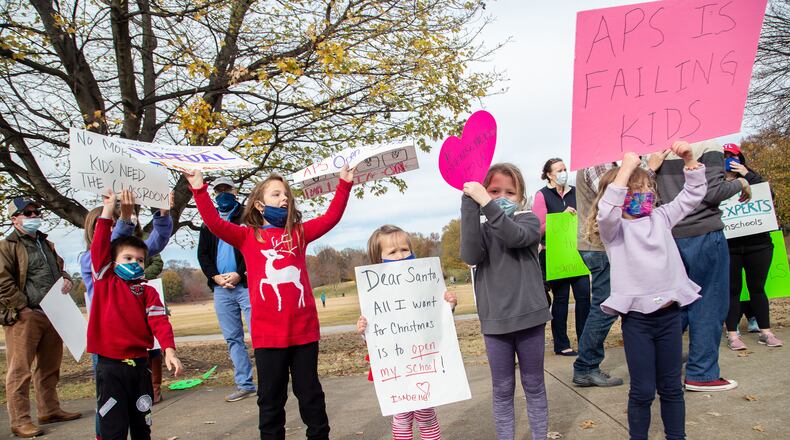Schools are winding down their first full semester of an experiment forced on them by COVID-19 -- resuming in-person classes while keeping their staffs and students safe from a highly contagious, highly persistent virus that has killed 282,436 Americans.
Teachers had to figure out how to balance online and in-person instruction, sometimes doing both simultaneously. (Of all the education craziness created by COVID, asking teachers to instruct kids in classrooms and virtually may go down as the most impossible task.)
Some metro districts – Atlanta, DeKalb, Clayton and City of Decatur – remain online. Others have reopened buildings with limits. Some reopened fully in August, but experienced rolling quarantines that are likely to increase after the winter holiday. Today, Dr. Anthony Fauci, director of the National Institute of Allergy and Infectious Diseases, warned of a January surge, saying, “Without substantial mitigation, the middle of January can be a very dark time for us.”
Parents in districts that have remained virtual are growing impatient, as seen in Sunday’s APS and DeKalb rally to reopen schools. Among the 100 or so people at the Piedmont Park event were students with signs proclaiming: “Santa, all I want for Christmas is to open my school.”
In emails to me, Atlanta and DeKalb parents express concerns their children will academically lose ground to peers in Gwinnett and Fulton, which reopened for face-to-face instruction. “What does that mean for students competing for spots at Georgia Tech or UGA next year or the year after?” asked one father.
Already, researchers are predicting worrisome attainment gaps in students learning remotely, a delivery method fraught with problems, including a lack of reliable connectivity in some parts of Georgia.
My AJC colleague Ty Tagami wrote a few days ago about insights gleaned from the 300 schools in Georgia that chart student growth in reading and math through Measure of Academic Progress or MAP testing.
While a comparison of MAP scores from this fall and a year ago found reading performance didn’t falter much, math skills lagged, possibly because parents were not as adept in filling in gaps in their children’s math instruction.
Of the national MAP results, Tagami wrote:
Although the results are not specific to Georgia, the 4.4 million test-takers sampled nationwide included about 170,000 from this state, so NWEA is confident that the results apply here too. Average gains on scores in math were between 5 and 10 percentile points lower for students this year compared with last year while reading was basically unchanged.
Several Georgia school districts that use the MAP tests observed similar results in their own scores except they also noticed something that NWEA didn't report. The organization dismissed the scores in kindergarten through second grade, deeming them too unreliable given the number of children who took the tests at home. But kids that young were back in school in time for the tests this fall in some Georgia districts, including in Marietta.
“We looked at our K-2 data and that was the most alarming for us," said Belinda Walters-Brazile, Marietta's deputy superintendent. “The younger the student, the more impact it's had on their regression." On the bright side, she said, the Marietta math scores didn't dip as much as the national average.
I would like to ask teachers what they are seeing.
- For those teaching remotely, are you worried about gaps? How can schools address those gaps?
- For teachers now in face-to-face classes, are you doing a lot of catch-up? How is that going?
- Some education advocates contend COVID-19 will make remote learning a fixture now in K-12 education. Do teachers on the front lines agree? Have we worked out the kinks?
About the Author
The Latest
Featured



